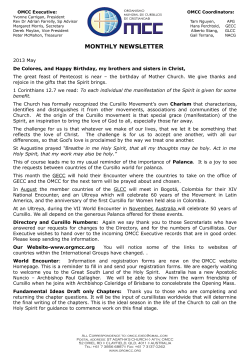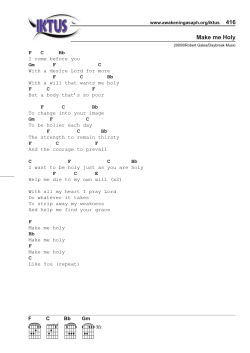
How to Read the Bible for All Its Worth An Outline of
How to Read the Bible for
All Its Worth
An Outline of
Reformed Biblical
Hermeneutics
Dr. Jeffrey A. D. Weima
Calvin Theological Seminary
weimje@calvinseminary.edu
Major Elements of a Reformed
Hermeneutic
Major Elements of a Reformed
Hermeneutic
1. The Holy Spirit Element
2. The Grammatical Element
3. The Literary Element
4. The Historical Element
5. The Theological Element
The Holy Spirit Element
John 14:26
―But the Counselor, the Holy
Spirit, whom the Father will
send in my name, will teach
you all things and will remind
you of everything I have said
to you.‖
John 16:13-15
―When the Spirit of truth comes, he will guide
you into all the truth …he will take what is mine
and declare it to you.‖
The Holy Spirit Element
1 Corinthians 2:10-11
―God has revealed it to us by his
Spirit. The Spirit searches all
things, even the deep things of
God. For who among men knows
the thoughts of a man except the
man's spirit within him? In the
same way no one knows (e[gnwken)
the thoughts of God except the
Spirit of God.‖
The Holy Spirit Element
1 Corinthians 2:14
―The person without the Spirit
does not accept (devcetai) the
things that come from the
Spirit of God but considers
them foolishness, and cannot
understand (ouj duvnatai gnw`nai)
them because they are
discerned only through the
Spirit‖
The Holy Spirit Element
Issue:
Does the illuminating work
of the Holy Spirit cause
believers to KNOW or to
ACCEPT the will of God as
revealed in the Bible?
Luther, The Bondage of the Will
―... no man perceives one iota of
what is in the Scriptures unless
he has the Spirit of God. All men
have a darkened heart, so that
even if they can recite everything in Scripture, and know
how to quote it, yet they
apprehend and truly understand
nothing of it... For the Spirit is
required for the understanding of
Scripture, both as a whole and in
any part of it.‖
John Calvin (in a sermon on 1 Timothy 3:8-10):
―When we come to hear the sermon
or to take up the Bible, we must not
have the foolish arrogance of thinking that we shall easily understand
everything we hear or read. But we
must come with reverence, we must
wait entirely upon God, knowing
that we need to be taught by his Holy
Spirit, and that without Him we
cannot understand anything that is
shown to us in his Word.‖
Klaas Runia, ―The Hermeneutics of the Reformers,‖ Calvin Theological
Journal 19.2 (1984): 121-152.
―Finally, if we want to come to a
truly biblical hermeneutics, we must
realize with the Reformers that the
Word of God cannot be understood
without the illumination of the Spirit
of God ... The final key to the
hermeneutics of the Reformers is the
confession ‗Spiritus Sanctus est
Verus Interpres Scripturae‘ (the Holy
Spirit is the true interpreter of
scripture). Therefore the beginning
and end of all biblical hermeneutics
is the humble prayer ‗Veni Creator
Spiritus‘ (Come, Creator Spirit)‖ (pp
151-152).
J. I. Packer, ―Understanding the Bible: Evangelical Hermeneutics,‖
Honoring the Written Word of God (Paternoster, 1999) 3.147-160.
―The characteristic procedures and
techniques of evangelical hermeneutics are
now before us, and it remains only to add
that the evangelical way of practicing them
involves radical dependence on the Holy
Spirit, a dependence that is expressed by
prayer for wisdom and insight before,
during, and after the hermeneutical exercise
itself. Evangelicals do not forget that sin, as
an inbred anti-God perversity of the soul,
disables minds from understanding God no
less than it disables wills from obeying him,
so that divine help is needed at every stage
of the process of receiving the divine
message‖ (page 158)
Robert H. Stein, Playing by the Rules. A Basic Guide to Interpreting
the Bible. Grand Rapids: Baker, 1994.
―… it would appear that what the
Reformers called ‗illumination‘ refers to
understanding the meaning of the text,
‗conviction‘ to the attribution of a
positive significance to the text. In other
words, the Spirit helps the reader
understand the pattern of meaning that
the author willed and convinces the
reader as to the truth of that teaching‖
(page 64)
Consequences of the Holy Spirit
Element:
1.
The need for humility before scripture
2.
The need for careful study of scripture
―The role of the Spirit in interpretation is not an
excuse for laziness …To pray that the Spirit would
help us understand the meaning of a text because
we do not want to spend time studying or using the
tools that have been made available to us (such as
commentaries, concordances, dictionaries, etc.)
may border on blasphemy, for it seeks to ‗use‘ the
Spirit for our own ends. The Holy Spirit brings to
the believer a blessed assurance of the truthfulness
of the biblical teachings, but he cannot be manipulated to cover for laziness in the study of the
Word of God‖ (Grand Rapids: Baker, 1994: 71)
Consequences of the Holy Spirit
Element:
3. The need to keep the Holy Spirit and scripture connected
together:
• ―If we live by the word alone, we dry up.‖
• ―If we live by the Spirit alone, we blow up.‖
• ―But if we live by the word and the Spirit, we grow up!‖
Consequences of the Holy Spirit
Element:
3. The need to keep the Holy Spirit and scripture connected
together:
―The Spirit may blow where,
but not what, He wills‖
Kevin J. Vanhoozer, Is There a
Meaning in This Text? (Grand
Rapids: Zondervan, 1998) 429.
Major Elements of a Reformed
Hermeneutic
1. The Holy Spirit Element
2. The Grammatical Element
3. The Literary Element
4. The Historical Element
5. The Theological Element
The Grammatical Element
Thesis: ―Every translation involves interpretation‖
The Grammatical Element
Italian Proverb: ―Traduttore traditore‖
(―The translator is a traitor‖)
The Grammatical Element
Swedish Bible Translation Committee:
―The art of translation is the art of compromise‖
The Grammatical Element
Haim Nachmam Bialik (1873-1934: Jewish poet):
―Reading the bible in translation is like kissing
your bride through a veil‖
The Grammatical Element
Grant Showerman (1870-1935; Prof. of Classics,
Univ. Wisconsin; translator of classical works):
―Translation is sin‖
Example 1: Luke 11:5-8 ―Parable of the Friend at Midnight‖
11:5Then
he [Jesus] said to them, ―Suppose one of
you has a friend, and he goes to him at midnight and
says, ‗Friend, lend me three loaves of bread,
6because a friend of mine on a journey has come ...
... to me, and I have nothing to set before him.‘ 7―Then
the one inside answers, ‗Don‘t bother me. The door is
already locked, and my children are with me in bed. I
can‘t get up and give you anything.‘8 I tell you, though
he will not get up and give him the bread because he is
his friend, yet because of the man‘s boldness [marginal
reading: persistence] he will get up and give him as
much as he needs. ‖ (NIV)
ajnaivdeian (anaideian) = ―boldness‖
ajnaivdeian (anaideian) = ―persistence‖
Example 2: Luke 11:9
―So I say to you: ‗Ask (aijtei'te/aiteite) and
it will be given to you; seek
(zhtei'te/zêteite) and you will find; knock
(krouvete/krouete) and the door will be
opened to you‖ (NIV)
Present Imperatives =
ongoing, continuous action
Example 3: 1 Timothy 2:12
12 ―I
permit no woman to
teach or to have authority
(aujqentei`n/authentein)
over men‖ (NIV)
1. Traditional View: ―to have
authority over‖
2. Challenging View: ―to
represent oneself as originator
of‖
Major Elements of a Reformed
Hermeneutic
1. The Holy Spirit Element
2. The Grammatical Element
3. The Literary Element
4. The Historical Element
5. The Theological Element
The Literary Element
Genre: A technical term for different types
of writings or categories of literature
The Literary Element
Types of Genres in Scripture:
History:
Genesis, Joshua, Judges, 1-2 Samuel, 1-2 Kings, 1-2
Chronicles, Acts
Letters:
Paul (13), John (3), Peter (2), James, Hebrews, Jude,
Revelation 2-3
Poetry:
Psalms, Song of Songs, much of prophetic material
The Literary Element
Wisdom:
Proverbs, Ecclesiastes, Job, some Psalms, James
Apocalyptic:
Revelation, Daniel 7-12, Zechariah, parts of Ezekiel,
Mark 13
Legal:
parts of Exodus, Leviticus, Numbers, Deuteronomy
The Literary Element
Gospels:
Matthew, Mark, Luke, John
Parables:
Four Gospels, parable of Nathan to David (2 Samuel
12:1-4)
The Literary Element
Psalm 92:1-2 (Poetry: ―Merismus‖)
―It is good to praise the Lord
and make music to your name, O Most High,
to proclaim your love in the morning
and your faithfulness at night.‖
The Literary Element
Matthew 5:29 (Hyperbole)
―If your right eye causes you to sin, pluck it out
and throw it away.‖
The Literary Element
Revelation 13:1 (Apocalyptic)
―And I saw a beast rising out of the sea, with
ten horns and seven heads, with ten diadems
upon its horns and a blasphemous name upon
its heads.‖
The Literary Element
Revelation 13:1 (Apocalyptic)
―And I saw a beast rising out of the sea, with
ten horns and seven heads, with ten diadems
upon its horns and a blasphemous name upon
its heads.‖
Elephant = ?
Noose = ?
1998
The Literary Element
Revelation 13:1 (Apocalyptic)
―And I saw a beast rising out of the sea, with
ten horns and seven heads, with ten diadems
upon its horns and a blasphemous name upon
its heads.‖
City = ?
Dragon = ?
―Today, Hong Kong …?
(July 1, 1997)
The Literary Element
Proverbs 26:4-5 (Wisdom)
―Do not answer a fool according to his folly,
or you will be like him yourself.
Answer a fool according to his folly,
or he will be wise in his own eyes.‖
The Literary Element
1. Literary Devices in Letters:
Example: The ―Appeal‖ Formula
Carl J. Bjerkelund, Parakalô:
Form, Funktion und Sinn der
parakalô-Sätze in den paulinischen
Briefen (Oslo: Universitetsforlaget,
1967).
The Literary Element
Example: The ―Appeal‖ Formula
A. Form: 4 main parts
1. Verb ―I appeal‖ (parakalevw) or its synonym ―I ask‖ (ejrwtavw)
in the first person
2. The recipients of the appeal
3. Prepositional phrase indicating source of sender‘s
authority to appeal (this element typically occurs only in
official correspondence and not in private letters)
4. Content of the appeal: introduced by a ―that‖ (oJtiv or i{na)
clause
The Literary Element
-
Paul’s letters: Four basic elements
Example: Romans 12:1
―I appeal to you therefore, brothers, by the mercies of God,
that you present your bodies as a living sacrifice, holy,
acceptable to God, which is your spiritual worship‖
1. The verb: ―I appeal‖
2. The recipients: ―to you, brothers‖
3. Prepositional phrase: ―by the mercies of God‖
4. The content of the appeal: ―that you present …‖
Other examples: Rom 15:30; 16:17; 1 Cor 1:10; 4:16; 16:15-16; 2 Cor
2:8; 10:1-2; Phil 4:2; 1 Thess 4:1, 10b-12; 5:14; 2 Thess 3:14; Eph 4:1
The Literary Element
B. Function
- Primary function:
- to indicate a major transition in the text
- formula marks transition either from the
end of the thanksgiving to the beginning
of letter body (1 Cor 1:10; Phlm 8-9) or,
as more typically happens, a transition
within the body of letter (Rom 12:1;
15:30; 16:7; 1 Cor 16:15; 2 Cor 10:1;
Phil 4:2; 1 Thess 4:1; Eph 4:1)
¶
New
Paragraph
Sign
The Literary Element
B. Function (cont)
- Secondary function:
- appeal formula used in official correspondence when writer had a good relationship
with recipients and confidently expected
them to do contents of letter
- Appeal formula thus expresss a more
friendly, less heavy-handed tone
- Paul uses the appeal formula in this
nuanced manner, where his authority is
not in question and he can make a request DO IT OR ELSE!
rather than a command in the confidence
that his appeal will be obeyed
The Literary Element
C. Appeal Formula in Philemon
―Therefore, although in Christ I could be bold and command
you to do what you ought to do, more because of love I
appeal—I, Paul, an old man and now also a prisoner of
Christ Jesus—I appeal to you concerning my child, to whom
I gave birth in prison, Onesimus…‖ (vv 8-10)
The Literary Element
2. Literary Devices in Hebrew Poetry:
Example: Inclusio
• inclusio (sometimes referred to
as bracketing or envelope
structure): the repetition of a
key word, phrase or sentence at
the beginning and ending of a
literary unit, thereby
functioning as bookends and
marking the boundaries of that
unit
The Literary Element
2. Literary Devices in Hebrew Poetry:
Example: Inclusio
Psalm 118:1-29
―Give thanks to the Lord, for he is good;
his love endures forever‖ (verse 1)
―Give thanks to the Lord, for he is good;
his love endures forever (verse 29)
Major Elements of a Reformed
Hermeneutic
1. The Holy Spirit Element
2. The Grammatical Element
3. The Literary Element
4. The Historical Element
5. The Theological Element
The Historical Element
Importance of the Historical Context
Example: Luke 10:25-37
–Parable of the Good Samaritan
The Good Samaritan, Rembrandt
Parable of the Good Samaritan
Samaritans = Decendants of 10 Lost Tribes of Israel
Parable of the Good Samaritan
Parable of the Good Samaritan
Jesus speaks with the Samaritan woman
at a Well. Catacomb Mural, 4th/5th AD.
John 4:9 ―The Samaritan woman said to him, ‗How is it
that you, a Jew, ask a drink of me, a woman
of Samaria?‖
Parable of the Good Samaritan
36 ―Which
of these three do you think was a
neighbor to the man who fell into the hands
of robbers?‖
37 The expert in the law replied, ―The one who
had mercy on him.‖
Jesus told him, ―Go and do likewise.‖
The Historical Element
Problem of the ―Historical Gap‖
Scripture as ―Culturally Conditioned‖
Scripture as ―Culturally Bound‖
John Cooper, A Cause
for Division, 1991:
―But first it is crucial to
reiterate that all of the
Bible is authoritative and
normative for today. The
issue is not whether the
Bible is normative or
which parts are normative,
but how it is normative for
today.‖ (p. 26)
Acts of Synod, 1978
―Hermeneutical Principles
Concerning Women in
Ecclesiastical Office‖:
―A distinction must be
made between a moral
principle and the
application of that
principle. The former is
normative for the Christian
life today, the latter is not
necessarily so.‖ (p. 500)
Louis Berkhof, Reformed
Dogmatics (Grand Rapids:
Eerdmans, 1932; 2nd revised
edition, 1941): 174-175
―Sometimes we may have to come
to the conclusion that, while
certain laws no more apply in the
form in which they were cast, yet
their underlying principle is just as
binding today as it ever was.‖
John Cooper, A Cause
for Division, 1991:
―Reformed hermeneutics
recognizes the difference
between a principle and the
application of that
principle. A principle states
God‘s abiding will for our
lives, but how that
principle is applied may
vary according to time and
place.‖ (p 29)
J. I. Packer ―Understanding the Bible: Evangelical Hermeneutics,‖
Honouring the Written Word of God (Carlisle: Paternoster, 1999)
3.157 (originally published in Restoring the Vision: Anglican
Evangelical Speak Out [1990]: 39-58).
―So, just as it is possible to identify in
all the books of Scripture universal and
abiding truths about the will, work and
ways of God, it is equally possible to
find in every one of them universal and
abiding principles of loyalty and
devotion to the holy, gracious Creator;
and then to detach these from the
particular situations to which, and the
cultural frames within which, the books
apply them, and to reapply them to
ourselves in the places, circumstances,
and conditions of our own lives today‖
(page 157)
Differing Degrees of Cultural Influence in
Scripture
Minimal Cultural Influence: Col 3:1-3
―Since (literally ‗if‘), then, you have been raised with Christ, set your
minds on things above, where Christ is seated at the right hand of
God. Set your minds on things above, not on earthly things. For you
died and your life in own hidden with Christ in God‖
Step 1: Discover the abiding principle or underlying
moral truth claim (exegesis)
Step 2: Apply that abiding principle to today‘s new and
contemporary situation (homiletics)
Differing Degrees of Cultural Influence in
Scripture
Some Cultural Influence: Eph 2:11-22
Division between Jewish Christians and Gentile Christians over the
issue of circumcision.
Step 1: Discover the abiding principle or underlying
moral truth claim (exegesis)
Step 2: Apply that abiding principle to today‘s new and
contemporary situation (homiletics)
Differing Degrees of Cultural Influence in
Scripture
Great Cultural Influence: 1 Cor. 16:20b
―Greet one another with a holy kiss‖
Step 1: Discover the abiding principle or underlying
moral truth claim (exegesis)
Step 2: Apply that abiding principle to today‘s new and
contemporary situation (homiletics)
Holy Kiss
Major Elements of a Reformed
Hermeneutic
1. The Holy Spirit Element
2. The Grammatical Element
3. The Literary Element
4. The Historical Element
5. The Theological Element
The Theological Element
Herman Bavinck,
Gereformeerde Dogmatiek
(Kampen: J. H. Kok, 1906):
―... ―Holy Scripture has a
purpose that is religiousethical through and through. It
is not designed to be a manual
for the various sciences. It is
the first principle only of
theology and desires that we
will read and study it
theologically‖ (p 471).
The Theological Element
Meaning of the Term
– God is the primary author of the bible
Louis Berkhof, Principles of
Biblical Interpretation (Grand
Rapids: Baker, 1950):
―Scripture contains a great deal that
does not find its explanation in history,
nor in the secondary authors, but only in
God as the Auctor Primarius ... In view
of all this, it is not only perfectly
warranted, but absolutely necessary, to
complement the usual grammatical and
historical interpretation with a third. The
name ―Theological Interpretation‖
deserves the preference, as expressive of
the fact that its necessity follows from
the divine authorship of the Bible‖
(pp 133-134)
The Theological Element
The Bible as a Unity
Interpreting Scripture with Scripture
The ―Analogy of Scripture/Faith‖
John Cooper, A Cause
for Division, 1991:
―The Bible is analogical-different texts speak to the
same issues, thus
modifying and reinforcing
each other as they present a
unified message ...What
God means to teach us in a
specific passage cannot be
understood apart from
everything else he teaches
us‖ (p 21)
―If we believe that each
individual writing found in the
Bible has a common divine
author, then our exegetical
exploration expands beyond the
relationship between a text and
the single biblical writing in
which it is found to include
questions about its relationship
to the entire biblical canon. We
are compelled to explore how
each part is in continuity with,
is consistent with, and must be
interpreted by the whole of
biblical teaching‖ (p 122)
Henry A. Virkler,
Hermeneutics (Grand
Rapids: Baker, 1981;
2nd edition 2007)
The Theological Element
Interpreting Scripture with Scripture
Example #1: Luke 14:26 ―If anyone comes to
me and does not hate his father and mother …he
cannot be my disciple.‖
= Hate parents?!
The Theological Element
Interpreting Scripture with Scripture
Jesus‘ words in Luke 10:27 ―Love your
neighbor as yourself‖—thus Jesus wants us to
love, not hate, others
The Theological Element
Interpreting Scripture with Scripture
Jesus‘ words in Luke 18:20 ―You know the
commandments: ‗Do not commit adultery, do not
murder, do not steal, do not give false testimony,
honor your father and mother.’”
The Theological Element
Interpreting Scripture with Scripture
―hate‖ = Jewish way of saying ―love less‖
Gen 29:30-31: Jacob ―loved Rachel more than
Leah … and Leah was hated‖; ―loved more‖ in the
first verse is restated as ―hated‖ in the second verse
The Theological Element
Interpreting Scripture with Scripture
Mal 1:2-3: God says, ―I have loved Jacob but Esau
I have hated‖; God did not actually ―hate‖ Esau but
rather ―loved him less‖ than Jacob
See also Deut 21:15-17; Judg 14:16; Prov. 13:24;
Isa. 60:15; Luke 16:13; Rom 9:13
The Theological Element
Interpreting Scripture with Scripture
Example #2: Church Discipline
• 1 Cor 5:1-2 ―… should you not have put out of
your fellowship the man who has been doing this?‖
(i.e., excommunication)
The Theological Element
Interpreting Scripture with Scripture
Example #2: Church Discipline
• Matthew 18:15-17
• 1st step: ―If a brother or sister sins, go and point
out the fault, just between the two of you. If he
or she listens to you, you have won them over‖
• 2nd step: ―But if they will not listen, take one or
two others along, so that every matter may be
established by the testimony of two or three
witnesses‖
The Theological Element
Interpreting Scripture with Scripture
Example #2: Church Discipline
• Matthew 18:15-17 (continued):
• 3rd step: ―If they still refuse to listen, tell it to the
church‖
• 4th step: ―and if they refuse to listen even to the
church, treat them as you would a pagan or tax
collector‖
The Theological Element
Interpreting Scripture with Scripture
Example #2: Church Discipline
• Galatians 6:1 ―Brothers, if a person is overtaken in
any sin, you who are spiritual should restore that
person in a spirit of gentleness‖
• 2 Thess 3:15 ―… and have nothing to do with him,
that he may be ashamed. And do not look on him as
an enemy but warn him as a brother‖
© Copyright 2025









